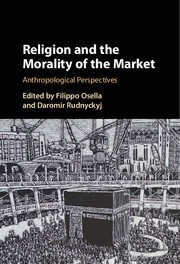Book contents
- Frontmatter
- Dedication
- Contents
- List of Figures
- List of Contributors
- Acknowledgments
- Introduction: Assembling Market and Religious Moralities
- 1 Risk, Fate, Fortune: The Lives and Times of Customs Inspectors in Southern China
- 2 Morality, Markets, and the Gospel of Prosperity
- 3 Religious Myths Retold: Masters and Servants in India's Corporate Culture
- 4 Divine Markets: Ethnographic Notes on Postnationalism and Moral Consumption in India
- 5 Merit Economies in Neoliberal Times: Halal Troubles in Contemporary Sri Lanka
- 6 “Structural Adjustment Islam” and the Religious Economy in Neoliberal Mali
- 7 Assembling Islam and Liberalism: Market Freedom and the Moral Project of Islamic Finance
- 8 Persistent Forms: Catholic Charity Homes and the Limits of Neoliberal Morality
- 9 Marketizing Piety through Charitable Work: Islamic Charities and the Islamization of Middle- Class Families in Indonesia
- 10 “A Poor Muslim Cannot Be a Good Muslim”: Islam, Charitable Giving, and Market Logic in Sri Lanka
- 11 “For God and the Country”: Agricultural Migrations and their Moralities in South India
- 12 “The Globalization of Indifference”: On Pope Francis, Migration and Global Acedia
- Index
- References
12 - “The Globalization of Indifference”: On Pope Francis, Migration and Global Acedia
Published online by Cambridge University Press: 13 April 2017
- Frontmatter
- Dedication
- Contents
- List of Figures
- List of Contributors
- Acknowledgments
- Introduction: Assembling Market and Religious Moralities
- 1 Risk, Fate, Fortune: The Lives and Times of Customs Inspectors in Southern China
- 2 Morality, Markets, and the Gospel of Prosperity
- 3 Religious Myths Retold: Masters and Servants in India's Corporate Culture
- 4 Divine Markets: Ethnographic Notes on Postnationalism and Moral Consumption in India
- 5 Merit Economies in Neoliberal Times: Halal Troubles in Contemporary Sri Lanka
- 6 “Structural Adjustment Islam” and the Religious Economy in Neoliberal Mali
- 7 Assembling Islam and Liberalism: Market Freedom and the Moral Project of Islamic Finance
- 8 Persistent Forms: Catholic Charity Homes and the Limits of Neoliberal Morality
- 9 Marketizing Piety through Charitable Work: Islamic Charities and the Islamization of Middle- Class Families in Indonesia
- 10 “A Poor Muslim Cannot Be a Good Muslim”: Islam, Charitable Giving, and Market Logic in Sri Lanka
- 11 “For God and the Country”: Agricultural Migrations and their Moralities in South India
- 12 “The Globalization of Indifference”: On Pope Francis, Migration and Global Acedia
- Index
- References
Summary
The perfect life coincides with the legibility of the world, sin with the impossibility of reading it.
Giorgio AgambenIt was not enough to proclaim poverty to make Western capitalism's forms of living conditional on Christianity: it was necessary to practice poverty, to nourish it, as a revolution.
Toni NegriIn the long history of the papacy, Francis is the first pope from the Americas. On the night of his election, he referred to himself as the new bishop of Rome, wittily suggesting that “it seems my brother Cardinals have gone almost to the ends of the earth to get him.” Since the beginning of his papacy, Pope Francis has brought attention to the geographical margins of the Catholic Church in relation to the historical centrality of Rome's Catholic Curia. At the same time, his public rhetoric and actions seek to put those whom he sees as socially marginalized (undocumented immigrants, the poor, those living in the deprived peripheries of cities, those with disabilities and others) at the centre of an internal renewal of the Catholic Church. By envisioning an evangelization from the (geographical and social) fringes, he has sent a warning to the heart of the Roman Catholic Church and the Curia Romana: that a worldwide renewal of Catholicism can be engendered only by placing people who are marginal at the evangelical centre of the Church and by curbing the self-referentiality and thirst for power of the Roman Curia.
As the first non-European pope and standing for those, like himself, who are from the “ends of the earth”, he gives visibility to concerns about poverty and inequality, which have a long and controversial history in the Catholic Church. With the choice of his papal name, Francis has drawn inspiration not only from his own religious order, the Society (“Company”) of Jesus, but also from the strength of the theological stances and historical experiences of the cenobic orders (which, especially the Franciscans, stress communal monastic life) within the Catholic Church.
- Type
- Chapter
- Information
- Religion and the Morality of the Market , pp. 263 - 284Publisher: Cambridge University PressPrint publication year: 2017
References
- 6
- Cited by



